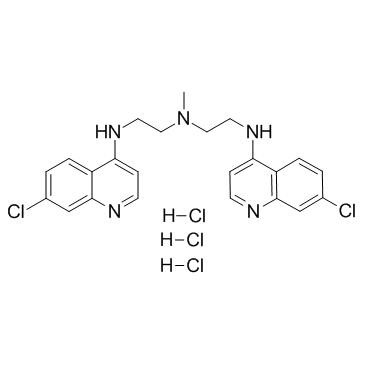1391426-24-6
| Name | Lys01 trihydrochloride |
|---|---|
| Synonyms |
N'-(7-Chloro-4-quinolinyl)-N-{2-[(7-chloro-4-quinolinyl)amino]ethyl}-N-methyl-1,2-ethanediamine trihydrochloride
1,2-Ethanediamine, N2-(7-chloro-4-quinolinyl)-N1-[2-[(7-chloro-4-quinolinyl)amino]ethyl]-N1-methyl-, hydrochloride (1:3) Lys01 (trihydrochloride) |
| Description | Lys01 trihydrochloride (Lys05) is a novel lysosomal autophagy inhibitor with IC50 values of 3.6, 3.8, 6 and 7.9 μM for 1205Lu, c8161, LN229 and HT-29 cell line in the MTT assay. |
|---|---|
| Related Catalog | |
| Target |
IC50: 3.6 μM (1205Lu), 3.8 μM (c8161), 6 μM (LN229), 7.9 μM (HT-29)[1] |
| In Vitro | Lys01, is a 10-fold more potent autophagy inhibitor than HCQ. Compared with HCQ, Lys05, a water-soluble salt of Lys01, more potently accumulates within and deacidifies the lysosome. Lys01 and lys01 trihydrochloride produce equivalent dose-dependent increases in the LC3II/LC3I ratio, accumulation of the autophagy cargo protein p62, and identical IC50 values in the MTT assay[1]. |
| In Vivo | With this high-dose, short-term treatment, no mice die, but after 2 d of dosing, mice treated with lys01 trihydrochloride 76 mg/kg i.p. are observed to have arched backs and lethargy. Morphologically, EM show that cells with intact nuclear and cytoplasmic membranes contain large AVs in lys01 trihydrochloride-treated tumors. Tumor growth is significantly impaired in lys01 trihydrochloride-treated tumors compared with controls. Lys01 trihydrochloride treatment results in a 53% reduction in the average daily tumor growth rate compared with vehicle-treated controls. A significant three- and six-fold accumulation of AV is observed at the end of 14 d of treatment in HCQ- and lys01 trihydrochloride-treated tumors, respectively, compared with control-treated tumors[1]. |
| Cell Assay | 1205Lu, c8161, LN229 and HT-29 cells are treated with lys01 trihydrochloride (0, 0.01, 0.1, 1, and 10 μM) or Lys01 (0, 0.01, 0.1, 1, and 10 μM) in five replicates for 72 h. The Acid Phsophatase Assay kit is used for the MTT assay[1]. |
| Animal Admin | Mice: To investigate the safety of lys01 trihydrochloride and its in vivo effects on autophagy, c8161 xenografts matched for tumor size are treated with i.p. daily PBS, or equimolar doses of HCQ or lys01 trihydrochloride [HCQ 60 mg/kg (138 nM/g), lys01 trihydrochloride 76 mg/kg (138 nM/g)] for 48 h[1]. |
| References |
| Molecular Formula | C23H26Cl5N5 |
|---|---|
| Molecular Weight | 549.751 |
| Exact Mass | 547.063110 |
